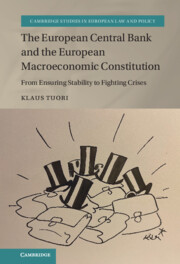 The European Central Bank and the European Macroeconomic Constitution
The European Central Bank and the European Macroeconomic Constitution Book contents
- The European Central Bank and the European Macroeconomic Constitution
- Cambridge Studies in European Law and Policy
- The European Central Bank and the European Macroeconomic Constitution
- Copyright page
- Contents
- Figures
- Series Editors’ Preface
- Preface and Acknowledgements
- Abbreviations
- 1 Introduction: A Supranational Central Bank as a Subject
- Part I The ECB as the Central Bank of the European Macroeconomic Constitution
- Part II Crises, ECB Measures and the Macroeconomic Constitution
- Part III The ECB from a Central Bank of Stability to a Central Bank of Crisis
- 11 The Fate of the European Macroeconomic Constitution
- 12 The Objectives for the ECB and the Macroeconomic Constitution Going Forward
- Epilogue: Where Do We Go from Here?
- Bibliography
- Index
12 - The Objectives for the ECB and the Macroeconomic Constitution Going Forward
from Part III - The ECB from a Central Bank of Stability to a Central Bank of Crisis
Published online by Cambridge University Press: 15 September 2022
- The European Central Bank and the European Macroeconomic Constitution
- Cambridge Studies in European Law and Policy
- The European Central Bank and the European Macroeconomic Constitution
- Copyright page
- Contents
- Figures
- Series Editors’ Preface
- Preface and Acknowledgements
- Abbreviations
- 1 Introduction: A Supranational Central Bank as a Subject
- Part I The ECB as the Central Bank of the European Macroeconomic Constitution
- Part II Crises, ECB Measures and the Macroeconomic Constitution
- Part III The ECB from a Central Bank of Stability to a Central Bank of Crisis
- 11 The Fate of the European Macroeconomic Constitution
- 12 The Objectives for the ECB and the Macroeconomic Constitution Going Forward
- Epilogue: Where Do We Go from Here?
- Bibliography
- Index
Summary
The last chapter is devoted to the fundamental transformation of the European Macroeconomic Constitution and particularly its objectives during the last decade that has also changed the ECB from a central bank of stability to a central bank of crisis. The great promise of the EMU that the properly designed and constitutionally protected macroeconomic framework would guarantee economic stability and prosperity has failed. In particular, the sole focus on price stability objective and constraints for national economic policy failed to ensure economic, fiscal, or even financial stability. The ECB 2021 strategy review tried to reflect these changes. The chapter analyses, how the ECB could seek to readjust its role in the euro area economy by incorporating new objectives. The discussion starts by analysing how and why the role of price stability has changed, which is followed by assessments of how the broader stability objective have gained more practical and eventually also formal importance. Furthermore, the objectives of structural economic adjustment and increasingly environmental sustainability are discussed as the new candidates for the objectives of the European Macroeconomic Constitution and the ECB. As an Epilogue, the book concludes with a broader forward-looking perspective on the options available.
Keywords
- Type
- Chapter
- Information
- The European Central Bank and the European Macroeconomic ConstitutionFrom Ensuring Stability to Fighting Crises, pp. 274 - 295Publisher: Cambridge University PressPrint publication year: 2022


